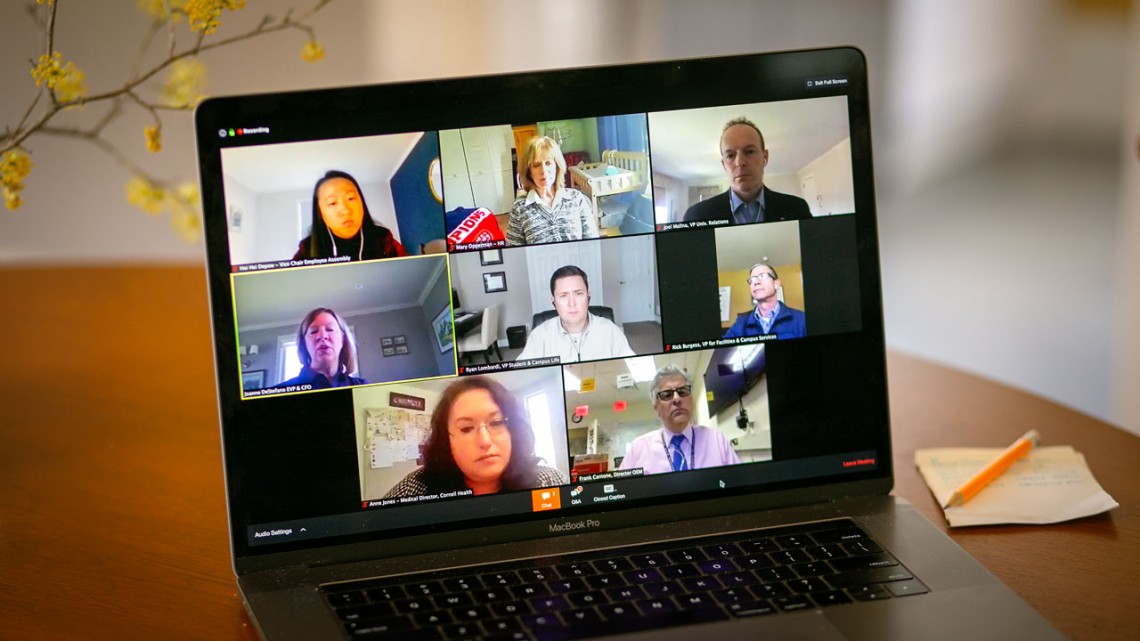
University administrators talk on Zoom during the April 1 Employee Assembly.
Leaders discuss budget measures at forum
By James Dean
Recently announced cost-saving measures, including salary and hiring freezes, will help preserve jobs as Cornell acts swiftly to weather budget challenges stemming from the COVID-19 pandemic, university leaders said April 1 during a virtual staff forum sponsored by the Employee Assembly.
Joanne DeStefano, executive vice president and chief financial officer, said that if the university made no budget adjustments, the Ithaca campus faced a $45 million loss by the end of its fiscal year on June 30 and a potential $100 million deficit next year.
“The actions that were taken earlier this week are a way to cut costs to help solve our projected budget issues with minimal staff disruption,” DeStefano said.
Six other senior leaders joined DeStefano for the third virtual staff forum in as many weeks addressing COVID-19 concerns: Mary Opperman, vice president and chief human resources officer; Joel Malina, vice president for university relations; Ryan Lombardi, vice president for student and campus life; Rick Burgess, vice president for facilities and campus services; Dr. Anne Jones ’04, director of medical services for Cornell Health; and Frank Cantone, director of the Office of Emergency Management.
They thanked employees for adapting to remote work, for sustaining essential services on campus and for providing vital medical care in hard-hit New York City.
“I am tremendously impressed at the dedication of our Cornell community,” Burgess said. “We’ve got all sorts of folks on staff who have come in and continued to provide necessary support for essential functions, and many, many others who are looking for ways to support our local community during a very trying time.”
One recent example: A partnership helping to establish a food pantry in downtown Ithaca that on its first day helped more than 120 local residents, Lombardi said.
The university continues to respond to a rapidly evolving public health crisis that in the last month has forced most undergraduates to return home early and prompted a three-week suspension of classes, which resume April 6 with virtual instruction.
About half of the immediate budget shortfall is attributable to lost revenue from housing and dining services, DeStefano said. Summer programs starting before July 12 also have been canceled or moved online.
Looking ahead, the university expects to significantly increase financial aid next year by $30 million to support families affected by the crisis, while continuing to conduct need-blind admissions – a “core principle,” DeStefano said.
Fewer international students are expected to enroll next year, she said.
Those and other financial considerations prompted the need for action, the leadership team said, including freezes on salaries, hiring and new construction, and a ban on all but essential travel.
The pay freeze alone will save $20 million, DeStefano said, and a similar amount could be saved if annual travel expenses were cut in half.
In addition, senior administrators have taken voluntary pay cuts over the next six months, the savings from which will be applied to financial aid.
Burgess said campus energy usage has been reduced by 30% as empty offices and inactive labs are powered down.
Every unit has been asked to withdraw postings for nonessential job openings and to be disciplined about expenses. “Every wise dollar spent will help us come out of this,” DeStefano said.
Malina said the university has been in close contact with elected officials to communicate how the crisis is impacting Cornell and assess any support from state and federal legislation.
Addressing common questions about health and safety, Jones discussed the need to take “reasonable precautions” to limit the spread of COVID-19, which she said is transmitted by respiratory droplets. Those precautions include the continued practice of social distancing and frequent hand-washing, and staying home when sick, she said.
“The more that we can all stay home unless we absolutely need to go out, the better,” Jones said.
As of April 1, the Tompkins County Health Department had reported 80 positive cases of COVID-19, with no deaths.
Answers to many student and staff questions and links to information – including opportunities to volunteer – are available on the university’s Novel Coronavirus (COVID-19) Resources and Updates and COVID-19: Workplace Guidance pages.
Opperman said university leaders are committed to being transparent even when they can’t answer every question or must share unwelcome news. While the pandemic’s long-term financial impacts are impossible to predict, she said, the recently announced spending cuts represent “good, solid measures” that will help the Cornell community going forward.
“The sooner we reduce our future costs,” Opperman said, “the more resources we will have to protect our workforce and our students in the future.”
The forum on Zoom drew more than 2,000 participants. Replays and transcripts of the March 18, March 25 and April 1 staff forums are available here.
Media Contact
Get Cornell news delivered right to your inbox.
Subscribe
